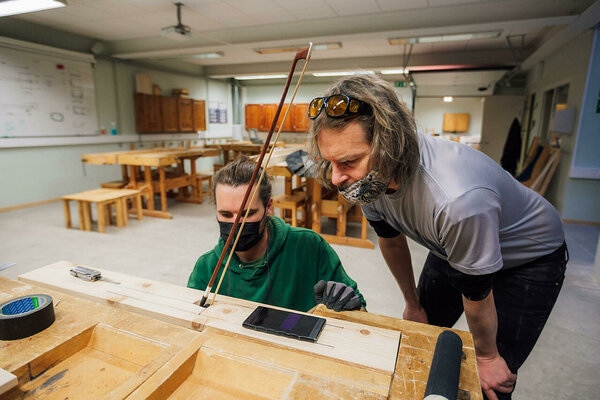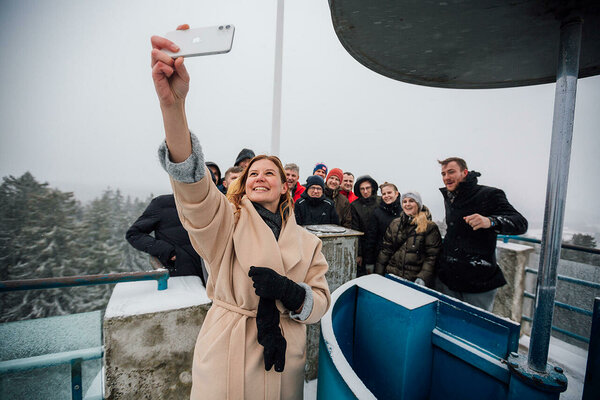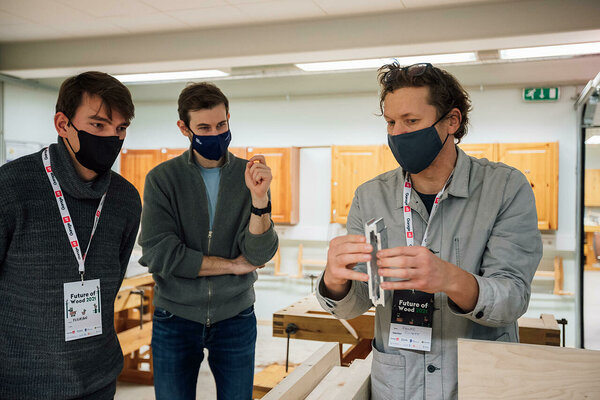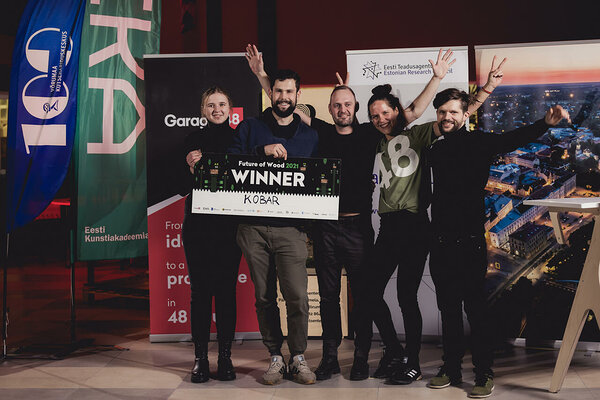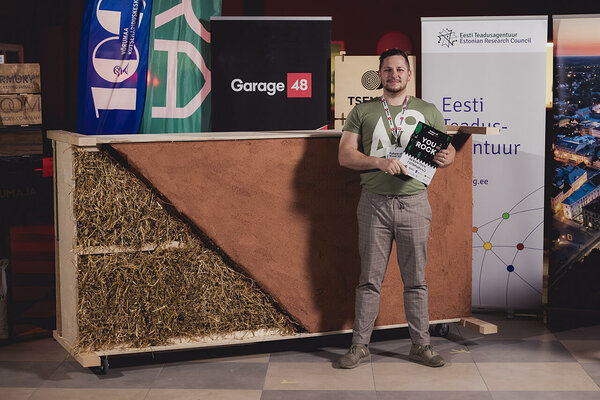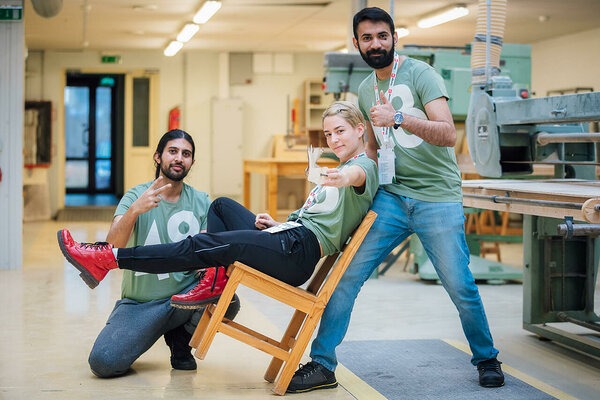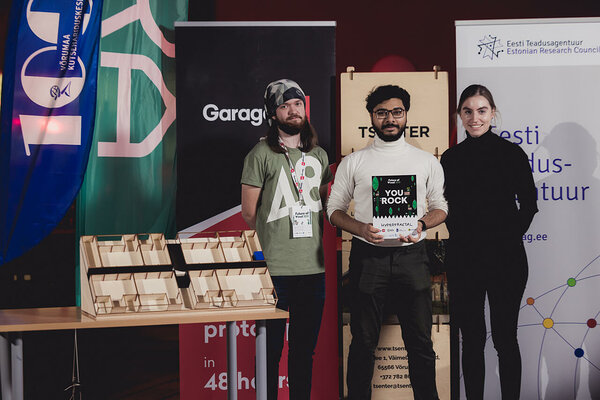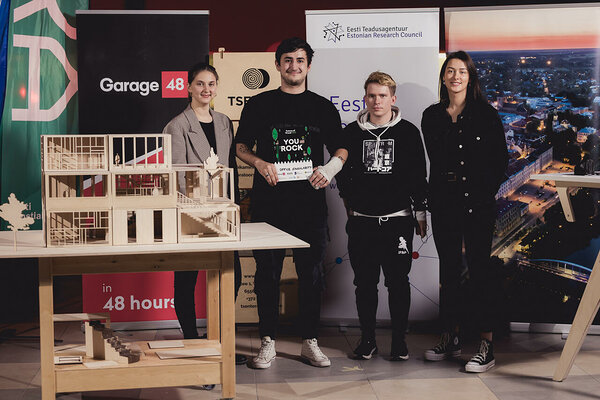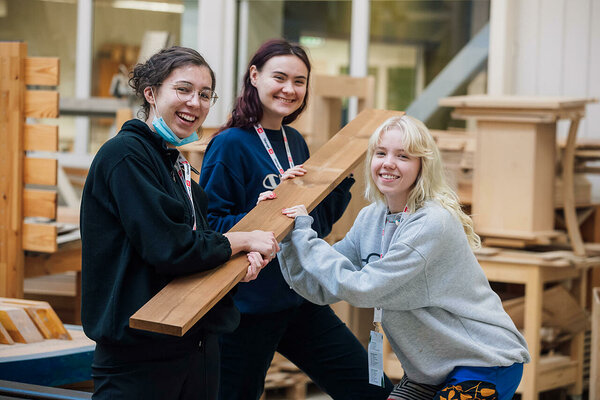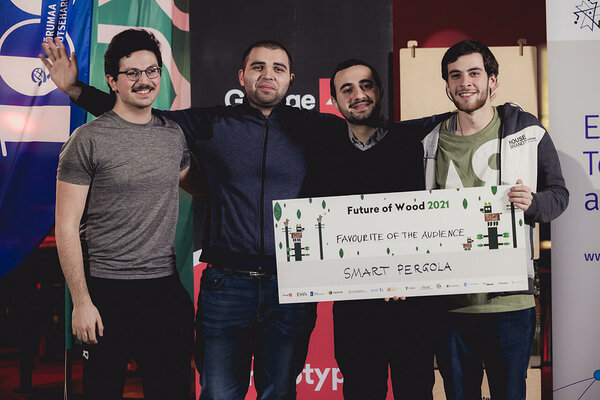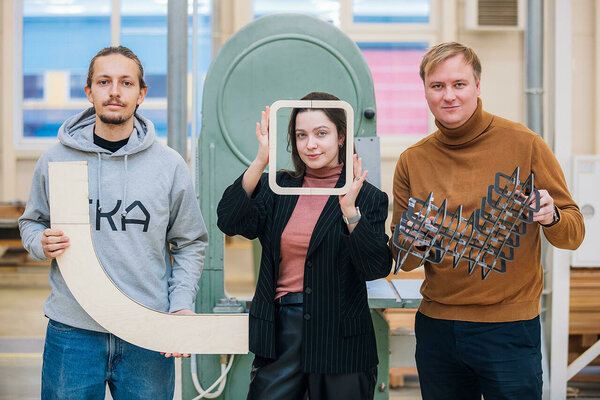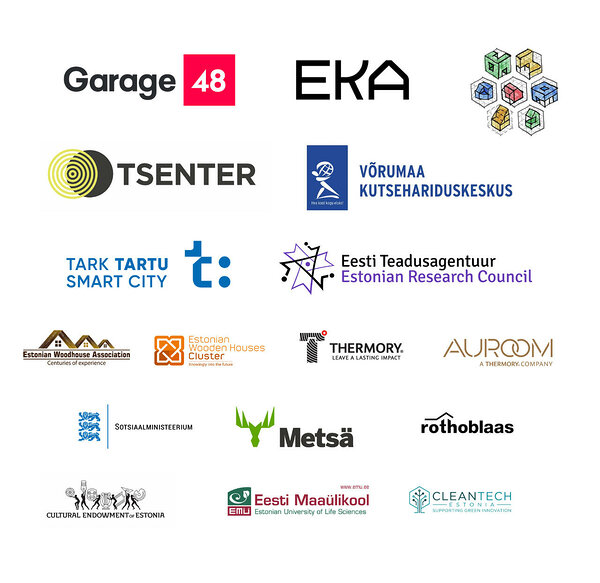Garage48 Wood makeathon series is 5 years old. Having started from an experiment in applying the Garage48 hackathon format to physical prototyping in wood technology, we’ve come quite a way with our partners in developing the format to enable solving the various challenges and tapping on the opportunities the fields connected to wood offer. The Garage48 Wood makeathon is a community event, taking the face of our organizing and challenge partners, with a special focus and wood dust scent each time.
“The aim of the Garage48 Future of Wood makeathon is to bring together people and organizations working in architecture, forestry and the wood industry, and to create a platform for cooperation. The event was co-organized by the Võru County Vocational Training Center, TSENTER Competency Center, Estonian Academy of Arts, Estonian Woodhouse Association, Estonian Research Council and Garage48. Together with the partners, we put forward seven challenges that open the sector up to new opportunities and ways of using wood. And this year we really saw how wood as a material can solve a wide variety of challenges from caring better for our older people to leading the way towards climate neutral economy.”
Kadri Kõivik
Project Coordinator of the Makeathon
Member of the Board at Garage48.
Challenges were put forward in cooperation with Thermory, Auroom, Metsä Wood, 369 Pattern Building System, Tartu City and the Ministry of Social Affairs.
“For the first time in the history of Garage48 this was the first event that we can call a timber house makeathon; 12 teams out of 14 were hacking timber buildings. All those teams showed that despite long traditions the wooden construction can be truly innovative. The winning team used the open-source 369 Pattern Building platform in order to demonstrate that every factory-made building can be a unique piece of architecture. They showed that modularity has a central role in turning construction into a green and circular practice.”
Renee Puusepp
Co-organizer of the Makethon and Member of the Jury
Senior Researcher at the Estonian Academy of Arts,
Renee Puusepp mentoring team Kobar.
The hackathon took place at the Võru County Vocational Training Centre, where wood technologists and furniture constructors study on a daily basis.
“Wood is a very flexible material. Honestly, we haven’t even started testing the limits of wood. Therefore, we can continue hacking wood for years to come. This year’s hack will be remembered as a very focused and practical development weekend. We didn’t just come up with new cool ways to use wood, but we looked for solutions to real challenges in the sector.”
Eveli Kuklane
Director of the Võru County Vocational Training Centre
The hackathon was a part of the curriculum for students studying at the Estonian Academy of Arts and the Võru County Vocational Training Centre. Nevertheless, students from other schools and specialists from companies make their way there as well.
Tartu, the most environmentally friendly municipality in Estonia supported solutions tackling climate neutrality and the participation of companies from the Tartu County.
“The Future of Wood is a great opportunity for companies to prototype and get feedback for product developments that they had previously written off. Who knows, maybe an idea will be born that will take one of our manufacturing companies to unicorn status.”
Katrin Kask
Head of Business Development of the Smart City of Tartu
Meet the winners!
KOBAR
OVERALL Winners; Winners of the “369 Pattern Building System”
and “Thermory: Wood in an Urban Environment” challenges
and straight pass to the Climate Launchpad TOP20.
Metsä Wood opensource platform challenge winner.
Team Kobar proposed new modules for the 369 Pattern Building System that create new spatial qualities and options for modular building.
“We were able to assemble an amazing team, where everyone could prove themselves. We are also incredibly grateful to mentors for their help, support and organization. We see promising opportunities for the project, so we want to continue to develop it in the future with the same wonderful team.”
Tatjana Štšurikova
Member of Team Kobar
Team members: Kristofer Soop, Uku Julian Tarvas, Tatjana Štsurikova, Kadi Pihlak, Jaan Zadin and Caspar Sild
STRAWALL
OVERALL Second place and winners of the Estonian Research Council challenge “Innovative valorization of wood biomass”
Team Strawall after their final pitch.
Strawall developed prefabricated construction panels for rapid installation made of hay, clay and wood. They took a building technique that’s over 100 years old to be able to build the best well-being environment with the smallest carbon footprint possible.
Team members: Sven, Magnus, Kert, Mailis and Sirli
GRAVY BENCHY
Winners of the TSENTER Competency Centre and Ministry of Social Affairs challenge “Wooden products for older people” and the Estonian Research Council challenge “Innovative valorization of wood biomass”
Team Gravy Benchy posing for the Favorite of the Audience competition.
Gravy Benchy created a rocking modular bench that helps the elderly stand up easily and encourages people to spend time in public spaces. They will be able to continue developing their idea using the labs and mentoring available at the Estonian University of Life Sciences.
Team members: Kira, Dushil and Fakhir
HYPERFRACTAL
Winners of the Tartu City “Climate Neutral Economy” and “369 Pattern Building System” challenges
Team HyperFractal is developing what they call the modular HyperApartment. The rooms and majority of the apartments will be constructed using pre-built modular units by Pattern Buildings 369 that are assembled on site. In this hackathon, they worked specifically on the bathroom module with full plumbing and ventilations system, designed the core structure for the staircase and corridors and designed a concept for a community wellness center on the roof with saunas, a lounge and a terrace.
Team members: Abdullah Siddiqui (Business Lead), Helin Kuldkepp (Team Lead), Laura Vilbiks (Architect), Patrick (Architect), and Jael (Structural Engineer).
OFFICE SINGULARITY
Winners of the “369 Pattern Building System” challenge
Office Singularity created a modular solution that allows architects to quickly put together creative designs for office buildings.
Their team consisted of architects.
LANDSCAPES
Winners of the Auroom Wellness challenge
Team Landscapes' modular sauna consists of four different modules that can be used individually or in various combinations. These can be combined based on personal preference and amount of space.
Team members: Mia Maripuu, Julia Freudenberg, Miia Laur and via zoom Adeoye Oludare, Tobi Felix
SMART PERGOLA
Favorite of The Audience
Team Smart Pergola at the award ceremony.
As their team name suggests, Smart Pergola added smart elements to a classic pergola. A pergola in Estonia can normally be used about three-four months out of the year. The team incorporated heating, electricity and four walls to the construction which extends its use into nine months every year.
Team members: Nikoloz Kalandarishvili, Ilia Lazishvili, Erekle Karaia Avel Chikviladze, Giorgi Okroshidze
The quality of the teams was so high that Ragnar Sass, one of the founders of Garage48, called us during the finals and put out a special surprise award with Metsik Loodus.
HEAOLU RUUM
Winners of the surprise award that gave them the opportunity to prototype their solution in their “Maidla Nature Resort” nature villa.
Team heaOLU posing for the Favorite of the Audience competition.
heaOLU ruum created a wellness room, which is made by the repetition of the modular wooden elements. The U-s, which by joining together into O-s make up the construction and the diversity of the room.
Team members: Diana Drobot, Andreas Hinojosa and Ander Roosipuu
Garage48 Future of Wood 2022 will take place in Tallinn at the Estonian Academy of Arts.
Check out the whole photo album.
See all the teams in the Favorite of the Audience photo album.
Rewatch the final demos and the award ceremony.
Photos by Maanus Kullamaa and Silver Gutmann. Garage48 Future of Wood 2021 is financed by the Estonian Academy of Arts, Estonian Research Council, Estonian Wooden Houses Cluster, Võrumaa Vocational Education Center, Cultural Endowment of Estonia and Tartu city, Estonian Ministry of Social Affairs, TSENTER Centre Competence for Wood Processing and Furniture Manufacturing, THERMORY , Metsä Wood and Rothoblaas.
